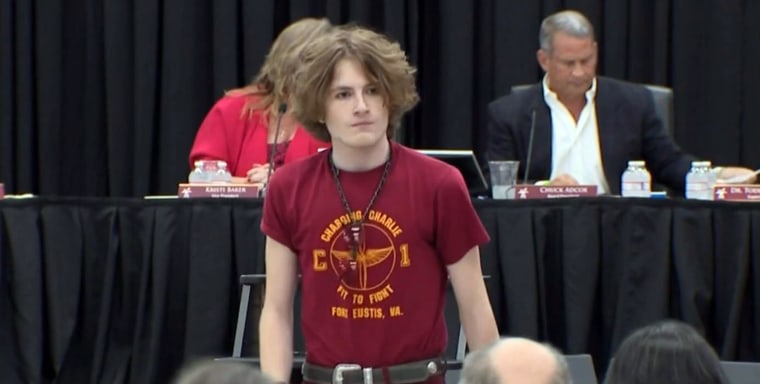Students in the Magnolia Independent School District in suburban Houston must adhere to several requirements when it comes to their hairstyles. Those include keeping their locks "clean, well-groomed, and worn out of the eyes," maintaining "appropriate hygiene at all times" and having a "natural hair color."
For males, the districtwide policy is even stricter: no beards, mustaches or long sideburns; hair can't be pinned up in a bun or held in a ponytail; and its length shouldn't be longer than the bottom of the ear.

For at least six boys, and one student assigned male at birth who identifies as nonbinary, having hair longer than permitted has come at a steep cost this school year: They've been suspended.
A federal lawsuit filed Thursday on behalf of those students by the American Civil Liberties Union of Texas argues the punishment is biased and violates both their constitutional rights and Title IX, the federal law that prohibits sex-based discrimination in schools. The students, who are identified by their initials, are seeking an injunction to halt enforcement of the policy.
"They have been denied classroom instruction, barred from extracurricular activities, and forced to be suspended and separated from their peers for well over a month simply because these students do not conform to Magnolia ISD's stereotypical notions of gender," according to the suit in U.S. District Court for the Southern District of Texas.
The school district said Thursday it was reviewing the suit and that its administration and school board are also looking at grievances filed by parents.
"Magnolia ISD respects varying viewpoints, and we respect the rights of citizens to advocate for change," spokeswoman Denise Meyers said in an email, adding that schools are regularly asked to accommodate children based on religion, gender identity, disabilities and other reasons, and that "Magnolia ISD considers all factors set out in law when considering such requests."
A survey last year by the ACLU of Texas found that nearly 500 public school districts in the state have some form of a boys-only hair-length rule.
Hairstyles in schools have become a point of contention across the country, particularly in districts where students of color say they were sent home or told to cut their hair, which civil rights advocates argue is discriminatory. The issue gained national attention again last summer when a federal judge in Texas blocked the Barbers Hill Independent School District, also near Houston, from enforcing a dress code policy that prohibited a Black teenager from keeping his dreadlocks and would have also confined him to in-school suspension.
Brian Klosterboer, an ACLU staff attorney, said the Magnolia School District appears to be taking discipline to a level that's detrimental to the students' learning. The students, he added, are not academically troubled or would otherwise be considered problem students.
One of the boys is Latino and wears a long ponytail, emulating his father and uncle with a hairstyle that is part of the family's heritage, Klosterboer said. The boy, who is 9 years old and in elementary school, was initially placed in in-school suspension for more than a month, then forced into a disciplinary alternative education program at another site, according to the suit. He is now homeschooled, while his sister, who attends the same elementary school and has long hair, was not disciplined.
"I don't think we've encountered what Magnolia is doing — that they're punishing a significant number of students," he said. "Three students have been pushed out of school. Three were suspended and in in-school suspension for five weeks."
Klosterboer said the students were looking forward to being back in the classroom for in-person learning after a school year of challenges and disruptions during the pandemic. He said he's unsure why the school district has "vigorously enforced" its hair policy, but that one of the plaintiffs has had long hair for the past five years without incurring disciplinary action.
Over the summer, some students and parents voiced opposition to the policy during a school board meeting. In a previous statement, the school district said it has had a dress code policy "for many years."
"The differentiated dress and grooming standards do not violate Title IX and are included in the student handbook each year," the statement said. "Magnolia ISD's approach to the dress code reflects the values of our community at large."
But Danielle Miller, whose 11-year-old child, Tristan, is nonbinary and a plaintiff in the lawsuit, disagrees. The length of Tristan's hair, which falls to the shoulders, and how they wear it does not diminish her child's ability to learn, Miller said, and their teachers are accepting of it.
"Tristan feels strong and confident with long hair," Miller said. "Tristan's hair is always clean and out of their face. I straighten it every couple of days because they like it that way. Sometimes they like to wear a ponytail or barrettes."
But administrators in the school district recognize her child as being male, Miller said, which has led to Tristan's suspension for nine days and they potentially face further punishment if they don't cut their hair. Miller added that she doesn't want to have to pull her child out of school.
The dispute over acceptable hairstyles boils down to this for Tristan, Miller said: "'It's dumb, Mom. It's just dumb that they don't accept, Mom.'"

